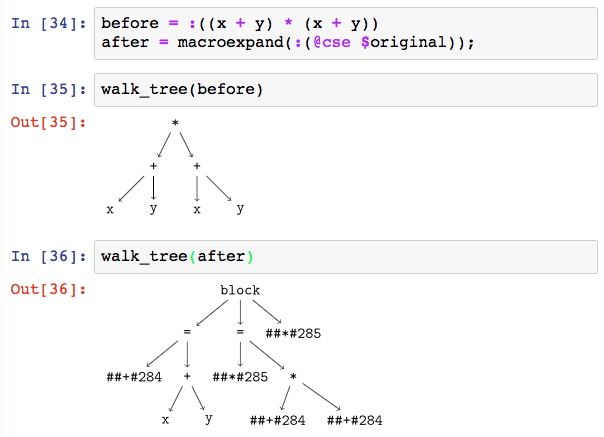Ecosyste.ms: Awesome
An open API service indexing awesome lists of open source software.
https://github.com/rdeits/commonsubexpressions.jl
Naïve combined subexpression elimination in Julia
https://github.com/rdeits/commonsubexpressions.jl
Last synced: about 1 month ago
JSON representation
Naïve combined subexpression elimination in Julia
- Host: GitHub
- URL: https://github.com/rdeits/commonsubexpressions.jl
- Owner: rdeits
- License: other
- Created: 2017-01-18T20:03:10.000Z (about 8 years ago)
- Default Branch: master
- Last Pushed: 2024-08-21T00:30:10.000Z (6 months ago)
- Last Synced: 2024-11-13T03:07:52.522Z (3 months ago)
- Language: Julia
- Size: 91.8 KB
- Stars: 37
- Watchers: 5
- Forks: 7
- Open Issues: 7
-
Metadata Files:
- Readme: Readme.md
- License: LICENSE.md
Awesome Lists containing this project
README
# CommonSubexpressions.jl
[](https://travis-ci.com/rdeits/CommonSubexpressions.jl)
[](https://codecov.io/github/rdeits/CommonSubexpressions.jl?branch=master)
This Julia package provides the `@cse` macro, which performs common subexpression elimination. That means that, given a piece of code like:
```julia
for i in 1:10
x[i] = foo(1) + i
end
```
in which the function `foo(1)` is evaluated 10 times, the `@cse` macro will produce code that moves that expression out of the loop:
```julia
foo_1 = foo(1)
for i in 1:10
x[i] = foo_1 + i
end
```
and thus only evaluates `foo(1)` once.
Arbitrarily complex nested expressions can be handled, and should result in more efficient code:
```julia
@cse inv(H) * (G + W) - (G + W)' * inv(H)
```
becomes:
```julia
inv_H = inv(H)
G_plus_W = G + W
inv_H * G_plus_W - G_plus_W' * inv_H
```
You can also wrap entire function definitions or code blocks:
```julia
@cse function foo(x)
[f(x) == i for i in 1:5]
end
```
# Caveats
*This package is very new and its results may not be correct. Please use it carefully and report any issues you find.*
Any function called within a block wrapped in the `@cse` macro *must be pure*. That is to say, the function must have no side-effects. The `@cse` macro *can not enforce or verify this*. If your function has side-effects, then the common subexpression elimination may change the behavior of your program, since those side-effects will not happen as often as you had expected.
### Brief aside on function purity
A pure function is one with no side-effects. When we say that a function has side-effects, we mean that calling it somehow changes the state of your program, beyond just the value that it returns. A trivial function that does have a side-effect is:
```
f_counter = 0
function f(x)
global f_counter
f_counter += 1
2 * x
end
```
which increases a counter `f_counter` every time it is called.
In addition, any function that mutates its input arguments can not be pure, since changing its input arguments constitutes a side effect.
# Visualization
The CSE transformation can be visualized using the [TreeView.jl](https://github.com/dpsanders/treeview.jl) package. Here's a very simple example:

# How it Works
This package does not (currently) construct a full data-flow graph like [DataFlow.jl](https://github.com/MikeInnes/DataFlow.jl). Instead, it performs a few relatively simple steps:
1. Initialize the set of *disqualified symbols* to {}
1. Initialize the list of *setup commands* to []
1. Walk the expression tree, repeatedly performing these steps:
1. If an assignment operation (like `x = 5`) is encountered, then add the target of the assignment (`x` in this case) to the *disqualified symbols*.
1. If a function call is encountered and all the function arguments are either constants or symbols, and those symbols are not *disqualified*, then:
1. Replace the function call in the current expression with a newly generated symbol
1. Append to the *setup commands* an expression which performs the function call and assigns it to the new symbol
1. Return the transformed expression, with all the *setup commands* prepended.
This simple procedure ensures that we only cache functions whose inputs do not change within the given code block (assuming that all function calls are pure, as required above).